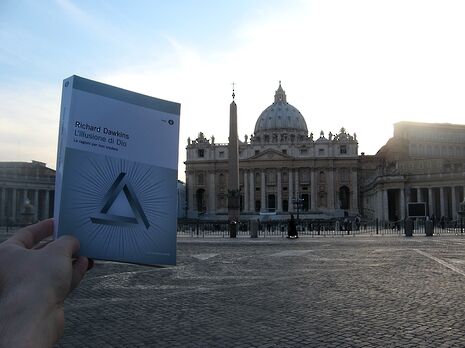The beauty of atheism
Not believing in God can lead us to have more faith in the world we know, argues Alice Chilcott

Atheism would seem to have committed the ultimate hypocrisy. In raising the profile of their stance, the argument goes, prominent atheists have broken their own law, and converted their non-belief into a quasi-religious movement. These days, Muslims have Allah, Christians have God, and atheists have Richard Dawkins. The latter is perhaps more active in converting people to his beliefs than either of the “real” deities have been for a few millennia.
On the surface, the logic of this criticism is impeccable. If theism is the belief in the existence of a God, atheism is quite simply the lack of such a belief. Why, then, should it even exist as a community, let alone require the same authority figures as, say, Christianity? But perhaps the temptation to ‘religionise’ atheism becomes more understandable when one considers the need for some sort of positive definition of it.
Atheism today is popularly defined in negative terms. Atheists are people who are too cynical to believe in God, or grew up in non-religious households, and are now just too lazy, or old, to reconnect with the abandoned spiritual side of themselves. Sadly, this idea is as difficult to tackle as it is convenient to perpetuate. Asked why one doesn’t believe, it is polite, easy, to shrug one’s shoulders and mutter something about “glass half empty”. Making a positive case for it is difficult – especially if you are concerned that doing so would cast aspersions on the faith of the person you are talking to. So we are atheists because some capacity for faith, some cosmological optimism, is lacking in us.
But I am not just an atheist because of a string of reasons beginning “I don’t” and “I can’t”. Not because I despise the religious establishment, nor because I’m indifferent to questions of philosophy, nor because I’m sadly just too much of a cynic to believe in God. I am an atheist because this world is enough for me. And I am kind of sick of hearing how sad it is that I don’t believe in God.
I do believe in the world I know – a world which is beautiful and certain. The experience of human friendship and love, the power of good poetry, the glory of Cambridge in the early morning sun, are undiminished by the absence of a deity. And the idea that, from the beginning of time itself, billions upon billions of fantastically improbable chances have conspired to create me, to create us, is at least as miraculous as the concept of Eve being fashioned out of Adam’s rib. As the marvelous Brian Cox said, we are literally made of stardust.
And what of death? Philip Larkin called it “the solving emptiness / That lies just under all we do”. The paradox of a “solving emptiness” is, admittedly, bleak. Life culminates in death, and death solves the questions of life only in the sense that it obliterates them, replacing them with a final blank. However, I prefer to interpret those lines in a different way: death does solve life, in a more satisfactory sense. The idea that one day our time will run out forces us to do something meaningful with it. It’s why we encourage one another to ‘seize the day’; why happiness and quality of life matter to us. How much would we value our lives if we knew them to be endless?
The truth is that some people simply don’t have a “God-shaped hole” in them. Atheism may be defined in the OED as "a person who disbelieves or lacks belief in the existence of God or gods", but, for myself and many other atheists, it is not about a “lack” of anything. It is a faith in the world we know, the people we love, and the principles we stand for. No wonder it teeters on the boundaries of religion.
As far as I am concerned, I only get one shot at this amazing world. So I am going to make it count.
 News / Cambridge launches plan to bridge ‘town and gown’ divide27 October 2025
News / Cambridge launches plan to bridge ‘town and gown’ divide27 October 2025 Arts / Reflections on the Booker Prize 202528 October 2025
Arts / Reflections on the Booker Prize 202528 October 2025 News / SU referendums heat up as campaigners claim intervention29 October 2025
News / SU referendums heat up as campaigners claim intervention29 October 2025 News / SU announces vote on NUS affiliation17 October 2025
News / SU announces vote on NUS affiliation17 October 2025 Film & TV / Finding space in Cambridge for the love of filmmaking29 October 2025
Film & TV / Finding space in Cambridge for the love of filmmaking29 October 2025









